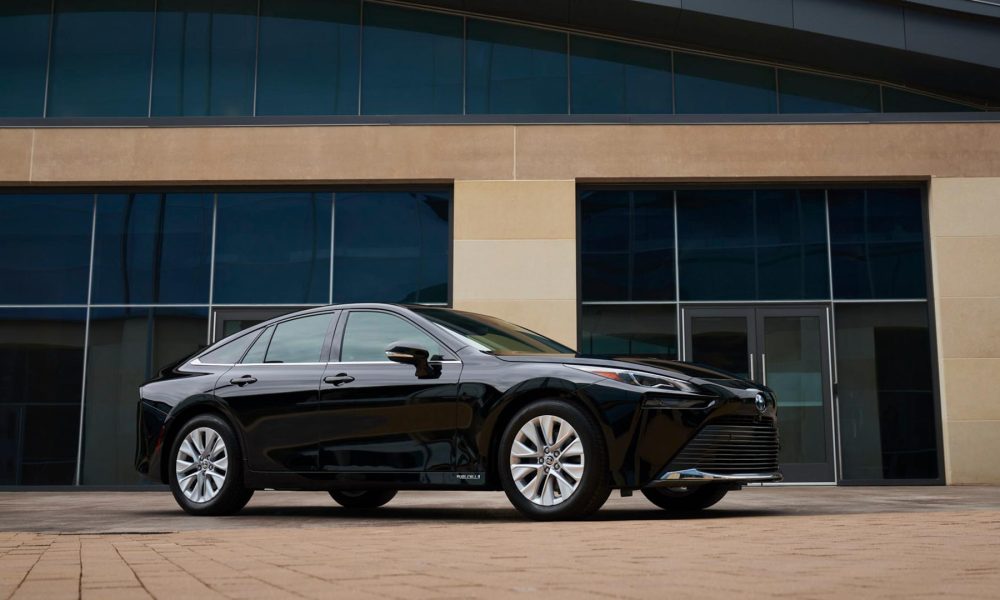Science
Lawsuit Against Toyota Highlights Failures in Hydrogen Car Market

The dream of a hydrogen-powered future is unraveling for many owners of the Toyota Mirai, who are now taking legal action against the automaker. Drivers in California allege that they were misled about the viability of the hydrogen fueling infrastructure, which has proven inadequate. With both prices for hydrogen soaring and fueling stations becoming increasingly scarce, many Mirai owners are left paying for vehicles they can no longer drive.
The situation escalated when Sam D’Anna experienced significant challenges shortly after purchasing his $75,000 Mirai in July 2022. After realizing that his hydrogen tank was nearly empty, he sought to refuel, only to discover that the closest station in Citrus Heights was offline. The next available option was nearly 25 miles away in West Sacramento. Despite the Mirai’s EPA-estimated range of 402 miles, D’Anna’s range indicator showed only 22 miles left.
“I’ve already signed,” D’Anna recounted to the Sacramento Bee, feeling the weight of his decision as he drove off the lot with the air conditioning off to conserve fuel. Now, his Mirai sits unused, covered, while he continues to pay $1,100 monthly for it, alongside a $1,200 payment for a replacement Ford F-150 hybrid he purchased in 2023.
Infrastructure Challenges Emerge
The ambitious vision for hydrogen infrastructure in California once appeared promising. The state invested tens of millions of dollars to establish a network of fueling stations, while automakers like Toyota, Hyundai, and Honda launched attractive zero-emission vehicles. The promise of quick refueling and minimal environmental impact seemed like a viable alternative to battery electric vehicles.
Unfortunately, the reality has fallen far short of expectations. Currently, California has approximately 50 hydrogen fueling stations, according to data from the Hydrogen Fuel Cell Partnership. The situation worsened in 2024 when Shell exited the market, closing several locations. Even operational stations frequently experience maintenance issues and inconsistent supply, leading to hydrogen prices tripling from around $70 to nearly $200 per fill-up.
Auto expert Patrick Peterson from GoodCar.com remarked, “The issue isn’t the tech, it’s everything around it. The infrastructure just isn’t ready.” He emphasized that while the technology of hydrogen vehicles is impressive, consumers are hesitant to rely on an unreliable fueling network.
Legal Action and Consumer Frustration
The legal backlash against Toyota includes a class action lawsuit filed in Los Angeles Superior Court. Plaintiffs accuse the automaker and its partners of fraud, negligence, and violations of consumer protection laws. They argue that buyers were misled about the viability of the hydrogen fueling ecosystem and are now trapped in financial commitments for cars that are not operational.
Another plaintiff, Ricky Yap, purchased his 2016 Mirai for $16,000, which included a prepaid fuel card worth the same amount. Initially, he found the fueling experience manageable, but as Shell’s closures led to longer lines at remaining stations, he ultimately ceased using the vehicle altogether. “I don’t want to pay insurance on a car that I can’t use every day,” Yap stated.
The lawsuit highlights the discontent among owners driven by environmental motivations and attracted by incentives and Toyota’s reputation. With the resale value of hydrogen cars plummeting, many owners feel deceived. For instance, Parita Shah, a physician assistant from Sacramento County, reported that a dealership offered her only $2,000 for her $36,000 Mirai after local stations shut down shortly after her purchase.
In July 2025, frustrated Mirai owners organized a demonstration in Los Angeles, holding signs that read “Mirai is a Lie” and “Toyota Made a Big Mistake.” Attorney Jason Ingber, representing the plaintiffs, criticized Toyota for selling vehicles dependent on a failing infrastructure, stating, “These are brands they thought they could rely on.”
Toyota has acknowledged the fueling issues and halted sales of new Mirais in the Sacramento area over a year ago. The company stated it is “working with affected Mirai customers to identify ways to help them on a case-by-case basis,” offering rental cars and service credits. Yet, plaintiffs argue that these solutions are insufficient.
Shah revealed that her reliance on a series of short-term rentals from Toyota, which require exchanges every 25 days, adds to her frustration as she continues making monthly payments on a vehicle she cannot drive.
The hydrogen vehicle market has faced significant hurdles since its inception. Since 2012, just under 18,000 hydrogen-powered vehicles have been sold in California, with Toyota accounting for the majority. In contrast, California now boasts millions of battery electric and hybrid vehicles on the road.
Government support for hydrogen infrastructure has also diminished. California’s annual commitment to developing hydrogen fueling stations has decreased from $20 million to $15 million, and that funding is no longer restricted to light-duty stations.
As public sentiment shifts, confidence in hydrogen technology wanes. Alex Black, Chief Marketing Officer at EpicVIN, noted that the lack of visible hydrogen vehicles and limited refueling options contribute to the growing distrust. “When public sentiment turns, all activity comes to an end: reduced demand, reduced investment, and fewer stations are built,” Black explained.
The challenges faced by early adopters of hydrogen vehicles serve as a cautionary tale. While the technology may hold promise, the current lack of reliable infrastructure and consumer trust presents significant barriers. For owners like D’Anna and Shah, the vision of a hydrogen-powered future has become a sobering reality, marked by ongoing payments for vehicles that sit unused.
-

 Politics4 weeks ago
Politics4 weeks agoSecwepemc First Nation Seeks Aboriginal Title Over Kamloops Area
-

 World5 months ago
World5 months agoScientists Unearth Ancient Antarctic Ice to Unlock Climate Secrets
-

 Entertainment5 months ago
Entertainment5 months agoTrump and McCormick to Announce $70 Billion Energy Investments
-

 Science5 months ago
Science5 months agoFour Astronauts Return to Earth After International Space Station Mission
-

 Lifestyle5 months ago
Lifestyle5 months agoTransLink Launches Food Truck Program to Boost Revenue in Vancouver
-

 Technology3 months ago
Technology3 months agoApple Notes Enhances Functionality with Markdown Support in macOS 26
-

 Lifestyle3 months ago
Lifestyle3 months agoManitoba’s Burger Champion Shines Again Amid Dining Innovations
-

 Top Stories2 months ago
Top Stories2 months agoUrgent Update: Fatal Crash on Highway 99 Claims Life of Pitt Meadows Man
-

 Politics4 months ago
Politics4 months agoUkrainian Tennis Star Elina Svitolina Faces Death Threats Online
-

 Sports5 months ago
Sports5 months agoSearch Underway for Missing Hunter Amid Hokkaido Bear Emergency
-

 Politics5 months ago
Politics5 months agoCarney Engages First Nations Leaders at Development Law Summit
-

 Technology5 months ago
Technology5 months agoFrosthaven Launches Early Access on July 31, 2025





















